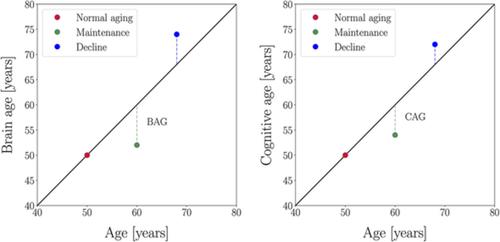当前位置:
X-MOL 学术
›
Hum. Brain Mapp.
›
论文详情
Our official English website, www.x-mol.net, welcomes your feedback! (Note: you will need to create a separate account there.)
Prediction of brain age and cognitive age: Quantifying brain and cognitive maintenance in aging
Human Brain Mapping ( IF 4.8 ) Pub Date : 2020-12-14 , DOI: 10.1002/hbm.25316 Melis Anatürk 1, 2 , Tobias Kaufmann 3 , James H Cole 4, 5 , Sana Suri 1, 2 , Ludovica Griffanti 1, 2 , Enikő Zsoldos 1, 2 , Nicola Filippini 1, 2 , Archana Singh-Manoux 6, 7 , Mika Kivimäki 7 , Lars T Westlye 3, 8 , Klaus P Ebmeier 1 , Ann-Marie G de Lange 1, 3, 8
Human Brain Mapping ( IF 4.8 ) Pub Date : 2020-12-14 , DOI: 10.1002/hbm.25316 Melis Anatürk 1, 2 , Tobias Kaufmann 3 , James H Cole 4, 5 , Sana Suri 1, 2 , Ludovica Griffanti 1, 2 , Enikő Zsoldos 1, 2 , Nicola Filippini 1, 2 , Archana Singh-Manoux 6, 7 , Mika Kivimäki 7 , Lars T Westlye 3, 8 , Klaus P Ebmeier 1 , Ann-Marie G de Lange 1, 3, 8
Affiliation

|
The concept of brain maintenance refers to the preservation of brain integrity in older age, while cognitive reserve refers to the capacity to maintain cognition in the presence of neurodegeneration or aging‐related brain changes. While both mechanisms are thought to contribute to individual differences in cognitive function among older adults, there is currently no “gold standard” for measuring these constructs. Using machine‐learning methods, we estimated brain and cognitive age based on deviations from normative aging patterns in the Whitehall II MRI substudy cohort (N = 537, age range = 60.34–82.76), and tested the degree of correspondence between these constructs, as well as their associations with premorbid IQ, education, and lifestyle trajectories. In line with established literature highlighting IQ as a proxy for cognitive reserve, higher premorbid IQ was linked to lower cognitive age independent of brain age. No strong evidence was found for associations between brain or cognitive age and lifestyle trajectories from midlife to late life based on latent class growth analyses. However, post hoc analyses revealed a relationship between cumulative lifestyle measures and brain age independent of cognitive age. In conclusion, we present a novel approach to characterizing brain and cognitive maintenance in aging, which may be useful for future studies seeking to identify factors that contribute to brain preservation and cognitive reserve mechanisms in older age.
中文翻译:

大脑年龄和认知年龄的预测:量化衰老过程中的大脑和认知维持
大脑维护的概念是指在老年时保持大脑完整性,而认知储备是指在神经退行性变或与衰老相关的大脑变化的情况下维持认知的能力。虽然这两种机制都被认为会导致老年人认知功能的个体差异,但目前还没有衡量这些结构的“金标准”。使用机器学习方法,我们根据 Whitehall II MRI 子研究队列(N = 537,年龄范围 = 60.34–82.76)中与正常衰老模式的偏差来估计大脑和认知年龄,并测试这些构造之间的对应程度,如以及它们与病前智商、教育和生活方式轨迹的关系。现有文献强调智商是认知储备的代表,病前较高的智商与较低的认知年龄有关,而与大脑年龄无关。根据潜在阶级增长分析,没有发现强有力的证据表明大脑或认知年龄与从中年到晚年的生活方式轨迹之间存在关联。然而,事后分析揭示了累积生活方式测量与大脑年龄之间的关系,与认知年龄无关。总之,我们提出了一种表征衰老过程中大脑和认知维持的新方法,这可能对未来的研究有用,旨在确定有助于老年大脑保存和认知储备机制的因素。
更新日期:2020-12-14
中文翻译:

大脑年龄和认知年龄的预测:量化衰老过程中的大脑和认知维持
大脑维护的概念是指在老年时保持大脑完整性,而认知储备是指在神经退行性变或与衰老相关的大脑变化的情况下维持认知的能力。虽然这两种机制都被认为会导致老年人认知功能的个体差异,但目前还没有衡量这些结构的“金标准”。使用机器学习方法,我们根据 Whitehall II MRI 子研究队列(N = 537,年龄范围 = 60.34–82.76)中与正常衰老模式的偏差来估计大脑和认知年龄,并测试这些构造之间的对应程度,如以及它们与病前智商、教育和生活方式轨迹的关系。现有文献强调智商是认知储备的代表,病前较高的智商与较低的认知年龄有关,而与大脑年龄无关。根据潜在阶级增长分析,没有发现强有力的证据表明大脑或认知年龄与从中年到晚年的生活方式轨迹之间存在关联。然而,事后分析揭示了累积生活方式测量与大脑年龄之间的关系,与认知年龄无关。总之,我们提出了一种表征衰老过程中大脑和认知维持的新方法,这可能对未来的研究有用,旨在确定有助于老年大脑保存和认知储备机制的因素。



























 京公网安备 11010802027423号
京公网安备 11010802027423号